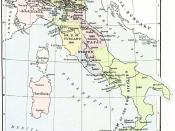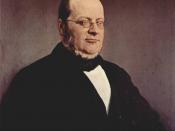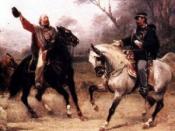Following the Napoleonic invasions, feelings of nationalism were left in both Italy and Germany causing the people to unite. Italian unification, or Risorgimento was able to succeed due to Giuseppe Mazzini's inspiration, Count Camillo Di Cavour's shrewd politics, and Giuseppe Garibaldi's military initiative. It was Bismarck's ingenious political maneuvers that led Germany to its unification in 1871. Both the Italian and German unification would shift the balance of power, and setting the stage for the First World War.
Giuseppe Mazzini was considered the creator and the soul of the Italian unification. His ideas were put into action with the formation of "Young Italy", which was a nationalistic organization that sought a united republic. The propertied middle class supported a united Italy, however favoring the King of Sardinia as a monarch. The clerical and conservative movement favored a presidency of the Pope with a federation of the Italian states. It was obvious that Italy sought a homeland free from foreign rule, but lacked the leadership to unify the various states.
King Victor Emmanuel II and Count Camillo Di Cavour would provide this leadership with their policies and actions. Being the strongest, largest, and most liberal state, Piedmont-Sardinia was able to lead the unification. Cavour's foreign policy was anti-Austrian due to Austria's occupation of many Northern Italian states, and its reluctance to allow a unified Italy. He therefore appealed to liberal nations such as, France and England to combat conservative Austria. By joining the Crimean War, Piedmont-Sardinia would gain favor with France.
This support from France would lead to the Plombieres Agreement in 1858, where France would declare war on Austria when it attacked Piedmont-Sardinia. Piedmont provoked Austria, causing the short war that would give Piedmont Lombardy. Revolutions soon sprang up in 1860, with Parma, Tuscany, Modena and Romagna overthrowing their...



Alright...
No conclusive summary which wraps up the whole essay, instead you mentioned what will happen in the future.. more like an article but pretty good.
0 out of 0 people found this comment useful.